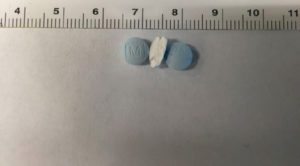DOJ Indicts Two In Northern California Who Distributed Counterfeit Pills Made With Fentanyl

Counterfeit Oxycodone Tablets Containing Fentanyl. Source: DEA
The U.S. Department of Justice (DOJ) announced a four-count indictment against two California men for distributing counterfeit oxycodone pills made with fentanyl. Alfredo Sanchez and Saybyn Borges were each charged with conspiracy to distribute and possess with intent to distribute over 40 grams of a mixture and substance containing fentanyl and possession with intent to distribute over 40 grams of fentanyl. Borges faces an additional count of distribution of at least 40 grams of a mixture and a substance containing fentanyl and Sanchez faces one count of felon in possession of a firearm.
According to the indictment, between May 3, 2018 and June 7, 2018, Sanchez and Borges conspired to distribute fentanyl. It is stated in the criminal complaint that the pair sold approximately 7,500 counterfeit oxycodone pills that testing determined contained fentanyl. During a controlled buy on May 21, 2018, the confidential source (CS) paid Borges $10,000 for a glass jar of pills. Hours later, the U.S. Drug Enforcement Administration agent managing the case received a call from the local police informing him that the CS had overdosed. The CS later admitted to taking three of the counterfeit pills before turning the rest over to the DEA and ingesting them.
According to The Sacramento Bee, when law enforcement attempted to arrest Borges during another controlled buy on June 7, 2018, he rammed his car up against an unmarked police car to make his getaway and was observed throwing items out of the windows as he drove. When police did manage to stop Borges, they found more than 100 small blue pills in his car plus hundreds of more along the roadway where the chase occurred.
If convicted, Borges and Sanchez face a minimum of five years and a maximum of life in prison and a fine of up to $5 million on the drug charges. Sanchez faces up to 10 years in prison and a $250,000 fine for the firearms charge. The DEA Tactical Diversion Squad investigated this case, and Assistant U.S. Attorney Cameron L. Desmon is prosecuting the case.